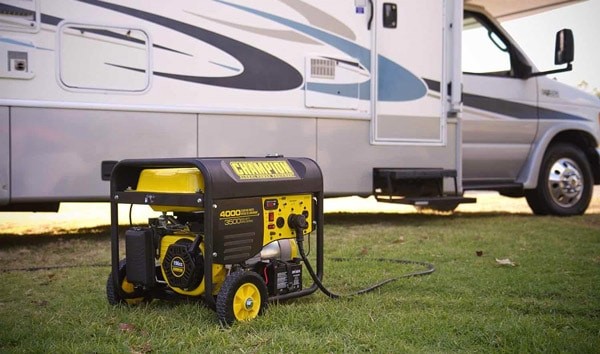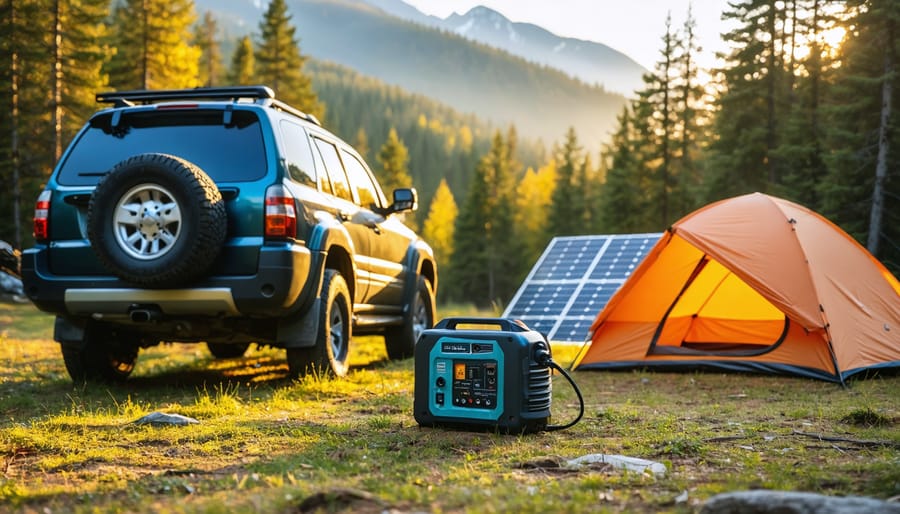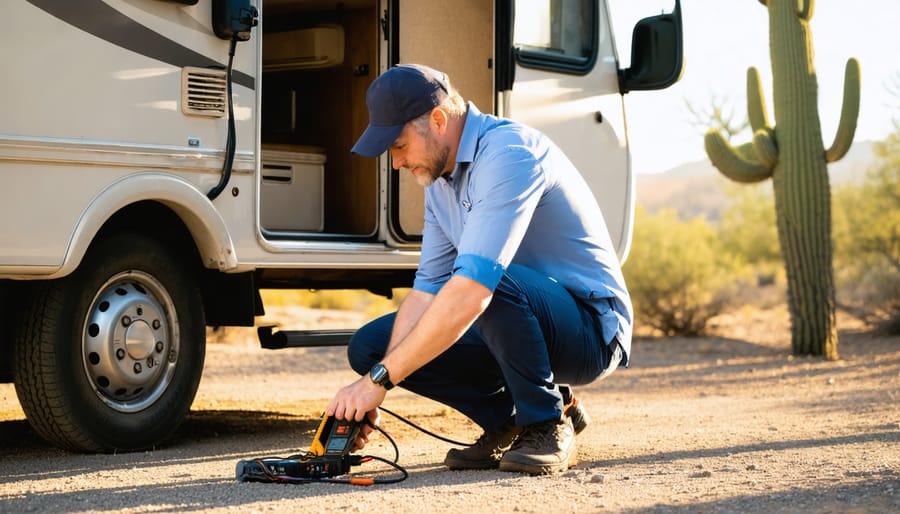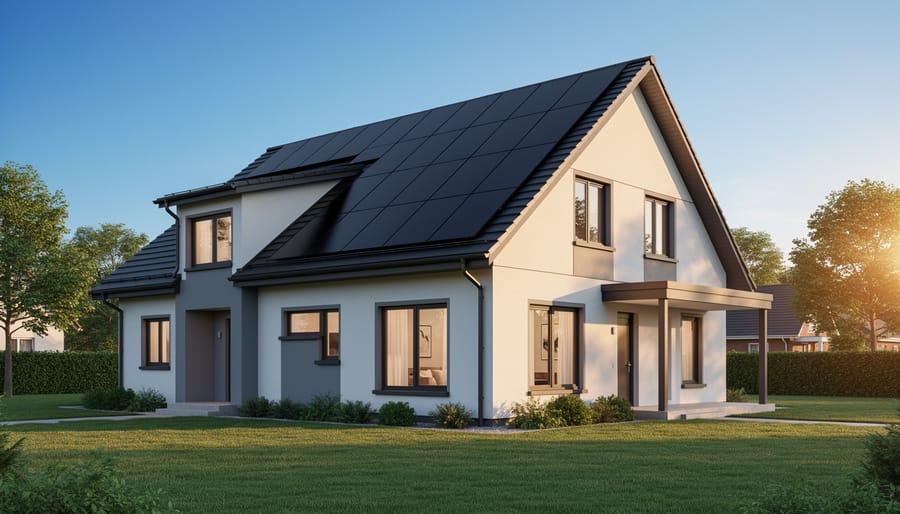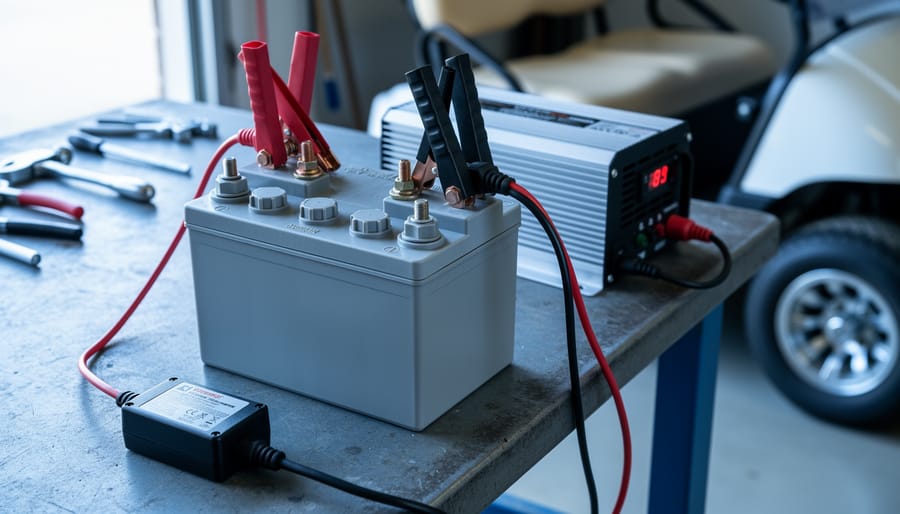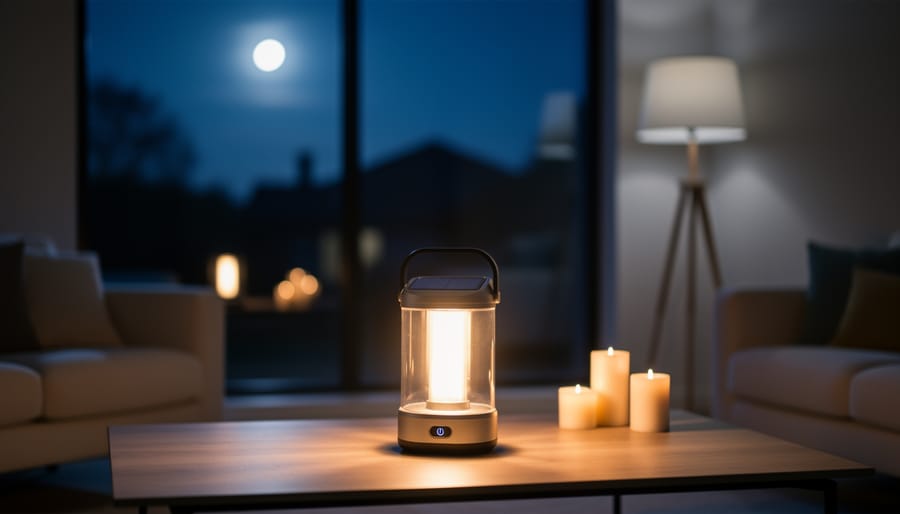Solar Panels vs. Generators Camping
Updated:

The solar panels vs. generators controversy for camping isn’t novel. It doesn’t mean you must forgo comforts like your air conditioner, phone, microwave, or coffee machine as a camper.
With a reliable power source, you can power these appliances. Now most campers either use fuel generators or solar panels. But the question remains which is best for camping?
Here, we’ll break down how solar vs. generator stack against each other across several categories. With this information, you can make the best camping choice and have an adventurous off-grid experience with adequate power.
Solar Panels or Generators Camping?
Maintenance
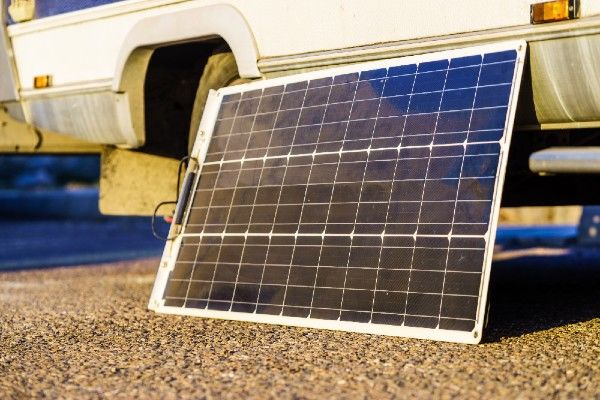
Solar
Solar panels are an excellent investment for campers. Once installed, they require very little maintenance to be kept in top condition. However, you may need to clean your panels after extreme weather conditions.
Aside from that, you may very well forget you have a solar panel system on the roof after you install it. Considering it has no moving parts, it will unlikely wear out immediately.
Generators
On the other hand, just like any other mechanical device, a gas-powered generator requires regular cleaning and servicing. You’ll need to learn to change oil, spark plug, and clean the air filter.
These are the basics, and they will cost you time and a few tools. The generator’s User’s Manual or YouTube videos can help if you’re unfamiliar with this.
Sometimes, generator maintenance may go beyond the basics, and you may need the services of a professional. Besides that, you may find it challenging to maintain on rainy days.
Based on that, in this solar panels vs. generators camping category, SOLAR WINS.
Cost
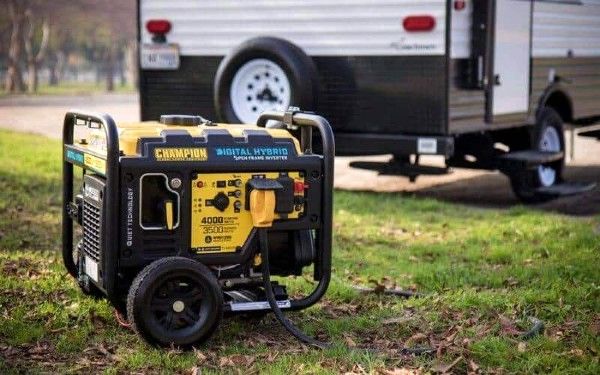
Solar
They have a high upfront setup cost. Not to mention, they use expensive lithium batteries. Most of the money spent will be purchasing a suitable battery bank (to store power). You’ll also need to buy an inverter to convert the direct current (DC) to a usable alternating current (AC).
Of course, you’ll further have to buy a panel kit. Although, they are usually not as expensive as the other two parts of the system. Plus, you may need to purchase some peripherals like cords and a charge controller.
Another setup cost to consider is the installation cost. Granted, you can install these units yourself, but it’s advisable to engage the services of a professional to set the kit up.
If DIY is wrong, it could damage everything and incur even more expenses. So be careful. However, it is worth noting that RV solar panels have zero post-installation cost. No doubt, going solar seems like a cheaper option.
Generators
Compared to solar, a generator is relatively cheaper to install. However, the total installation price depends on the generator size you install and the battery capacity.
Generators have a purchase price. The rest of the setup is simple and requires no expertise. However, gas-powered generators have ongoing costs over using solar.
You must regularly buy fuel (gasoline or diesel) and oil to keep them running. It wasn’t easy to pick a single winner in this category because it has several moving parts.
So we’ll call it a TIE here.
Noise & Restrictions
Solar
Since the solar panel system has no moving pieces, you won’t deal with the noise that a gas or diesel-powered appliance produces. Not to mention, it’ll run noiselessly for 24 hours.
It’ll also give you the power you need on cloudy days. Compared to the generator solar, they’re accepted at every camping site. And it’s free to run for long hours.
Given the fact that some camps mark some areas as “No Generators Allowed.” Owning a solar-powered RV will help you gain access to these serene areas. With it, you can listen to the birds’ tweets and the air whistle and have enough light for a fun time with other campers.
Generators
A generator is suitable for many things, but serenity is not among them. Engine sounds are never pleasing to the ears. For this reason, they’re often banned from several campsites.
Let’s face it. Generators cause noise pollution. Most times, there’s usually a restriction on the run time for generators in national parks.
For example, some parks do not allow generators to run for more than 10 hours. If you run out of power during the limited hours, the generator could leave you stranded.
Pro Tip: Check the sound rating (in decibels) before buying a generator. Some campsites accept up to 60 decibels of noise. You could also use one with 65 decibels. But anything more than that won’t get you a space to camp. Sad!
In this category of solar panels vs. generators camping, the solar makes the most sense.
Capacity
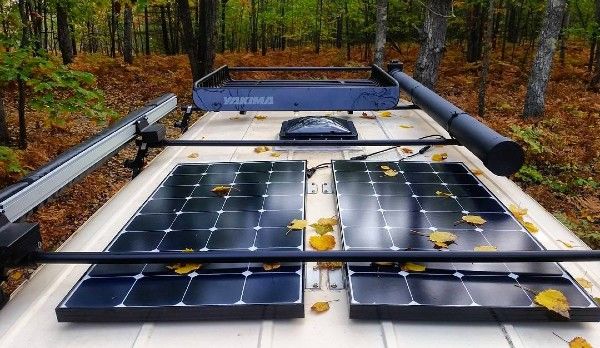
Solar
Most average-sized RVs can carry solar panels that generate between 200-300 watt/4.4 amps. At most, average-sized RVs can use up to 500W to fully charge your battery bank under the sun.
This is usually enough to run essential appliances like 12-volt light bulbs, 12V television, and a portable, energy-efficient fridge.
Using an alternative energy source becomes inevitable if your RV steadily runs power-hungry appliances like the air conditioner and refrigerator. Knowing the amount of watts solar you’ll need to run the solar will require calculation. Bear in mind that Volts × amps = Watts.
Keep in mind that all electrical current is measured in amps. Look around the specifications of your electronics, light bulbs, inverter, and other electrical devices.
By doing this, you can estimate how much power you’ll need. You’re left with two options if it exceeds what your panel can generate. To either reduce your energy consumption or use an alternative power source.
The solar amps hour (Ah) rating is critical because their electricity is usually emitted from a battery. The batteries may be unable to provide up to their rated power on snowy, rainy, and cloudy days. The energy produced may be reduced by 20 – 50%. Keep this in mind during your calculations. Connecting your solar panels to your RV batteries is simple and is doable by anyone.
Generators
On the other hand, generators can quickly provide anywhere with about 1000 — 3000 Watts of electricity depending on the size and capacity of the generator.
Plus, they provide their rated Watt continuously, irrespective of any external weather factors. Even though gas generators are compact, they still put out a more considerable amount of electricity than solar power.
They’re an excellent alternative power source if your solar panel system cannot provide your needed power.
So indeed, in this solar panels vs. generators camping, GENERATORS WIN!
Reliability
Solar
Concerning generators vs. solar, RV solar is very reliable because they require lithium batteries with at least 500 watts of power. Under stable weather conditions, you can use it for over an hour without charging the battery bank.
With zero input from you, the solar panel system is up there, sucking up as much sun as they can and converting it into electrical power stored in the batteries.
When you need power, the inverters convert the low-wattage DC battery into usable AC power. It’s that simple, and the kit is long-lasting. One major downside is their dependence on weather, which means they’re not an excellent choice for boondocking.
And they are as good as useless during extreme weather conditions — like torrential downpours or snowstorms. On moderately snowy days, your panels are still helpful. However, there’s usually a reduced output.
Generators
Generators function optimally irrespective of weather and without batteries. They’re excellent for boondocking. Plus, they allow you to camp off the grid, far from aids and amenities found at national parks.
This advantage makes it a good option for people who plan to camp in places with unreliable weather conditions. However, the fuel generator is more prone to mechanical failure than a solar-powered system.
Preventive maintenance like changing oil, cleaning the air filter, and monitoring the spark plug can significantly mitigate the chances of sudden mechanical failure. However, like most mechanical devices, it is often impossible to fully predict these things.
You may do everything right, but the generator will occasionally require repairs. For this reason, most people choose to use solar instead. The downside is, the generator offers little or no warning and could disappoint when you need it the most.
In terms of reliability, they both have their downsides, so we can safely call it a tie.
Environmentally Friendly
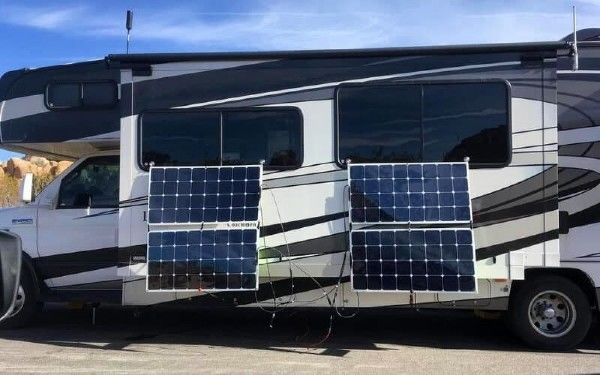
The difference here is quite clear. While solar panels utilize power from the solar system to create clean solar energy, generators burn fossil fuels and emit toxic gases like carbon monoxide to the atmosphere.
This means using solar gives you safer air to breathe, a clean environment, and fewer greenhouse gases.
Without further ado, we’re awarding a FLAWLESS VICTORY to solar panels in this category.
Weight & Size
Solar
The size of the solar system determines how many panels can fit on your RV’s roof. For context, most average-sized RVs can only contain two panels, while larger, high-end vans can have anywhere between 6-8 solar panels.
Regarding weight, the weight on top of your van already uses part of your van’s payload. So some other things may have to be in the car to avoid overloading your RV. On the bright side, you don’t have to struggle with moving the panels around.
Generators
Both gas and inverter generators are portable generators. They come in various sizes, but any size can fit into your van or car.
Although bigger batteries make your generator heavier, their weight is little compared to using solar. But it may require some fitness and athleticism to lift the generator in and out of the van.
Who wins this category? You choose.
Pros & Cons
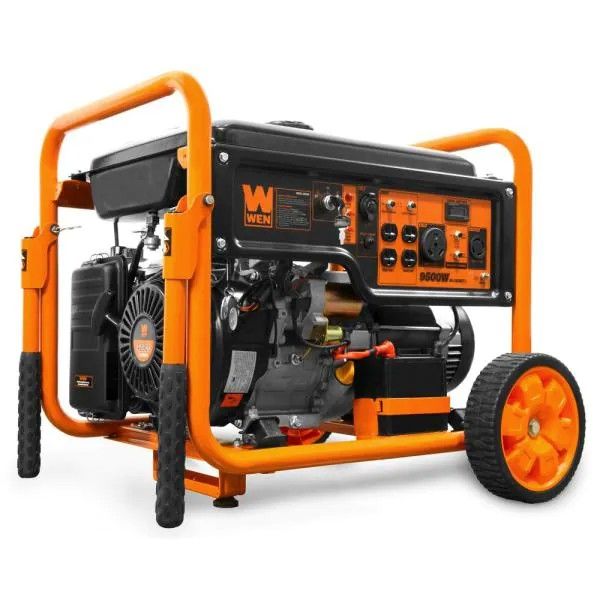
Both solar and gas-powered generators have their pros and cons. Up to this point, we’ve analyzed some of these characteristics. To summarize this debate, we’ll list some of its pros and cons.
Solar
Pros
- Clean, renewable energy
- When charged fully, the batteries can function for 24 hours.
- Requires no fuel, except the sun
- Quiet
- Low maintenance
Cons
- Slow recharging batteries
- High upfront fees
- Most of the kit does not include a battery.
- Usually dependent on weather
Generators
Pros
- Independent of weather
- Usually lesser set up costs
- Excellent for boondocking.
- Can potentially provide more electricity
- No need to charge any battery; they can power devices directly.
Cons
- Emits toxic gases
- Noise
- Requires fuel
- Relatively high maintenance cost
- Continuous running cost
FAQs
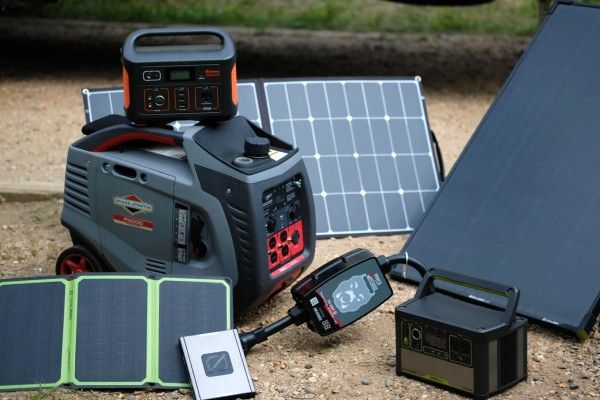
Do I Need a Generator If I Have Solar Panels?
“If I install solar panels, will I be immune to power outages?” This is a common question we’re often asked. Unfortunately, that’s not the case. Switching to a solar system doesn’t automatically make you immune to power outages because while you’re generating your electricity, you’re still connected to the public utility grid power.
While you may decide to completely sever your connection from the public utility grid or install a battery-backed system, it takes a lot of work and money.
The average homeowner isn’t ready for this much work. So, if you have solar installed, it may still be a good idea to have backup generators for sudden power outages.
However, in the context of RVs, you may not need backup power if you have solar, provided you don’t constantly run power-hungry appliances.
Alternatively, getting a high-end RV can help you access clean enough, renewable solar power to power all your needs.
For RVs, if you’re staying in a location with favorable weather conditions and have enough panels to provide all the electricity you’ll need, you may not need backup power.
Can The Solar Panel Replace Generators?
As stated above, a generator has its usefulness during sudden power outages. Plus, they’re helpful when you have an average-sized RV and wish to power high-watt appliances.
However, technology is fast developing, and the possibilities are limitless. While it still has some disadvantages, the future looks bright for solar. Meanwhile, if you want a bit of both, these are the best portable solar-powered generators you can try.
Are Solar Panels Worth It?
Taking the initial installation cost into consideration, this is a valid concern. The answer to this question depends on what it means to you. Clean, renewable energy? Noiseless? Cheaper energy? Extended running hour? Reliable battery bank?
Generally, solar panels are worth it if you generate enough power and frequently use them. Meaning if you use your RV once in a long while, installing them may seem too expensive.
The same goes for home solar installation. It’s worth it if you stay in your home long enough to enjoy the sun’s free energy and benefit from a drastic reduction in electricity costs.
On an economic level, solar panels have an excellent cost to benefit ratio, especially when used long term. They’re durable, reliable, and have a comprehensive controller. Campers will find them beneficial.
Using quality solar with an excellent battery will give you value for your money. If you need help choosing your RVs, you can check out the best solar panels for your RVs in 2021.
However, if you need advice and more information, check out this video.
Final Thoughts — Solar Panels vs. Generators Camping
The Solar panel and gas-powered generator both have their place. Solar panels offer cleaner, quieter, safer energy and tend to make more financial sense long term.
Generators, on the other hand, generally provide more electricity than solar power and without environmental influence. Throughout this article, we’ve let generators and solar panels go head-to-head.
To help you decide which of the two: solar panels vs. generators camping, look closely at the categories that matter most to you and see which of the two comes out top. However, you may not necessarily need to pick one winner. Both the generator and solar are helpful and can complement each other.
We understand this may be a significant decision for your camping, and we would be grateful if you could get it right. So if you still have any questions, we’ll be happy to help; ask them in the comments!

